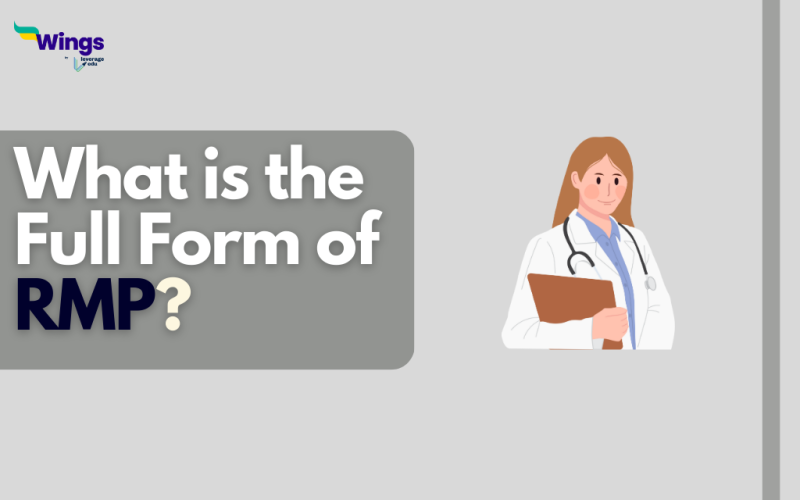The RMP full form is Registered Medical Practitioner. A Registered Medical Practitioner refers to a healthcare professional who is legally recognised and registered to practice medicine. The specific definition and requirements for being an RMP may vary from country to country. In general, an RMP is a licensed doctor who has completed the necessary education and training in medicine and has obtained the required qualifications and certifications to practice legally.
In many countries, including the United States, an RMP is commonly referred to as a Medical Doctor (MD) or a Doctor of Medicine. These individuals have typically completed a medical degree program from a recognised medical school, followed by a period of supervised clinical training called a residency program. After successfully completing the required training and examinations, they are granted a license to practice medicine.
Also Read: MD vs MBBS
Responsibilities of Registered Medical Practitioner
Table of Contents [show]
Some of the key responsibilities of a Registered Medical Practitioner are as follows:
- Assessing patients’ symptoms, conducting physical examinations, ordering and interpreting diagnostic tests, and formulating a diagnosis. Based on the diagnosis, providing appropriate treatment plans, prescribing medications, and performing medical procedures when necessary.
- Ensuring the well-being and safety of patients, monitoring their progress, and making adjustments to treatment plans as needed. Educating patients about their medical conditions, advising on lifestyle modifications, and providing necessary counselling and support.
- Maintaining accurate and detailed medical records for each patient, including medical history, examination findings, diagnoses, treatments, and follow-up plans. Ensuring patient confidentiality and complying with relevant privacy and data protection laws.
- Coordinating and collaborating with other healthcare providers, such as specialists, nurses, pharmacists, and therapists, to ensure comprehensive and coordinated patient care. Communicating effectively and sharing relevant medical information with the healthcare team.
- Keeping up-to-date with the latest medical knowledge, research, and developments in their field. Participating in continuing medical education activities, attending conferences, and maintaining professional certifications and licenses.
- Adhering to ethical principles and professional codes of conduct. Maintaining patient confidentiality, informed consent, and respecting patient autonomy. Following relevant laws and regulations governing medical practice, including prescribing medications responsibly and reporting certain diseases or conditions as required by law.
- Engaging in medical research, contributing to scientific knowledge, and staying informed about advancements in medical technology and treatments. Publishing research findings and sharing expertise with peers and the medical community
- Demonstrating professionalism in all aspects of medical practice, including empathy, respect, and effective communication with patients and colleagues. Maintaining their own physical and mental well-being, seeking support when needed, and avoiding burnout.
Also Read: Career in Regenerative Medicine: Stem Cell Therapy, Tissue Engineering & Biomaterials
Career Scope of Registered Medical Practitioner
In addition to the RMP full form, we must learn about the career scope of these medical professionals. The career scope for Registered Medical Practitioners is vast and offers various opportunities for professional growth and specialisation. Here are some of the career paths and options available to RMPs:
- General Practitioners
- Doctors with Specialisation such as Oncologist, Orthodontist, Gynaecologist, Dentist, etc.
- Doctors in Healthcare Institutions
- Academicians
- Research Scientists
- Public Health and Policy
- Healthcare Administration
- Global Health and Humanitarian Work
- Medical Consultancy
Some of the courses that an RMP could be interested in are –
- Nursing
- Public Health
- Geriatric Medicine
- Clinical Laboratory
- Pediatric Advanced Life Support (PALS)
- Advanced Cardiac Life Support (ACLS)
- Certified Medical Assistant (CMA)
- Emergency Medicine
- Occupational Therapy
- Physical Therapy
Also Read: How To Become A Chiropractor
How to Become a Registered Medical Practitioner (RMP)?
To become a Registered Medical Practitioner (RMP), you need to complete education, training, and pass exams. The steps vary by country but generally include:
1. Earn a medical degree from an accredited school (4-5 years).
2. Complete internships or residencies (1-3 years).
3. Pass licensing exams like the USMLE or MCCQE.
4. Apply for a medical license (usually involves a fee).
5. Register with a regulatory body (may require documentation).
Do make sure to research about your specific country.
Other RMP Full Forms
- Relationship Manager (RMP) in Banking
- Rist Management Plan in Pharmacy
- Revolutions Per Minute in Car
Popular Full Forms
We hope this blog has helped you understand the full form of RMP and everything related to it. If you want to know more, find 300+ full forms list on our blog. In the world of short forms, you can rely on the Leverage edu page to know about more full forms like this! Connect with us study abroad experts to achieve your international dream today!
 One app for all your study abroad needs
One app for all your study abroad needs















 45,000+ students trusted us with their dreams. Take the first step today!
45,000+ students trusted us with their dreams. Take the first step today!
